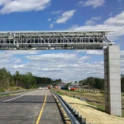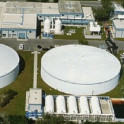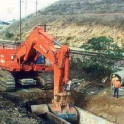TRAUNER previously reviewed the contractors’ CPM schedules and evaluated time-related claims for the North Carolina Department of Transportation (NCDOT). Based on that successful working relationship, TRAUNER was retained by the North Carolina Turnpike Authority (NCTA) under a five-year term contract to assist in the development and maintenance of the NCTA’s internal project schedules and to review the design-build teams’ project schedules for six planned toll roads across the state of North Carolina. To date, TRAUNER has completed three tasks. In the first task, we provided a comprehensive review and rewrite of the CPM scheduling specifications. TRAUNER also provided recommended revisions to the Change Order, Time Extension, Notice, and Damage provisions of the contracts going out to bid.
Under the second task, TRAUNER continues to develop and update the NCTA’s internal project schedules that depict each project’s full life cycle, including inception, design, planning and development, bidding, and construction. Additionally, TRAUNER is assisting with and providing training to those within the NCTA organization and other consultants in the implementation and use of Primavera 6.0.
For the third task, TRAUNER continues to review the design-build teams’ schedules during construction of what is expected to be six toll roads throughout the state. We are also assisting the NCTA in claims avoidance. TRAUNER is on-site full-time to review the design-build teams’ bids, develop and review cost-loaded schedules, review change order requests, evaluate delays, and monitor acceleration on the critical path. By performing a review of the design-build teams’ baseline schedules and monthly updates, we are able
The South County Regional Water Treatment Plant has a constructed capacity to produce 20 MGD per day. The facility was originally constructed in 1984 with a capacity of 4 MGD of lime softening water treatment process. In 1988, the facility was expanded by 8 MGD, bringing the total constructed capacity of the lime softening water treatment process to 12 MGD.
In 2004, a facility expansion was completed that added 8 MGD of reverse osmosis water treatment process in a separate process building on the same site. The facility included a well field, storage treatment tanks, and associated out-buildings, pump stations, and chemical treatment stations.
The contractor submitted a $3M claim citing project delays, inefficiency, and interference due actions by the owner and its representatives. A major factor in the claim was the removal of equipment from scope of work and the associated impacts. Trauner was hired by the owner to analyze liquidated damages.
Trauner was hired to assist in the analysis of costs associated with the failure of a large diameter sewer interceptor pipe lining on a $23.8M project in San Diego, CA. The contractor was sued by the City of San Diego for $9M in repairs. Trauner reviewed the city’s repair estimate and developed an independent estimate. After seeing Trauner’s estimate, the City and the contractor settled for 50% of the original value.
Trauner provided contractor advisory services during the construction of the Residence at the Ritz, a 45-story residential condominium next to the Ritz Carlton in Philadelphia, PA. During the project, Trauner analyzed the schedule to determine if the General Contractor had properly predicted the project end date. Trauner helped develop responses to a subcontractor who had submitted a claim to the general contractor and provided advice on settlement strategy.
The Walter E. Washington Convention Center is a $757M, 2.3 million sf facility in the heart of Washington DC. After the construction team experienced delays due to a steel collapse, Trauner was called in to assist the mechanical subcontractor with getting the mechanical work back on track. Trauner provided complete resource loading for the as-planned schedule; identified critical delays to the work; prepared a completion and recovery schedule to meet the project completion date; and integrated change orders and the steel collapse in the completion and recovery schedule. Trauner also performed a constructability review and delay analysis.
The Mansueto Library project at the University of Chicago is the construction of over 62,000 square feet of new library space that houses over 3.1 million rare books. The library houses these books in an underground facility 58 feet below grade and uses an automated storage and retrieval system to access the stored books and materials.
A Chicago-based architect designed the Joe and Rika Mansueto Library, which is topped with a glass dome and located at the University’s Hyde Park Campus. While the project is not seeking LEED certification, this project uses sustainable features by using recycled content for construction and diverting over 50% of construction waste to recycling centers.
Trauner was brought in by the construction manager while the project was ongoing. We performed an analysis of the schedules to identify project delays that have occurred on the project, to date. In addition, the construction manager asked Trauner to proactively assist with scheduling, schedule review, change order management, and claims avoidance on any issues that come up during the rest of the project.
Through an on-call contract, Trauner evaluated the validity of a Request for Equitable Adjustment (REA) that was submitted by a project management firm, Jacobs Facilities, Inc. (Jacobs), to the New Jersey School Development Authority (NJSDA).
NJSDA had awarded a contract to Jacobs to provide “Project Management Services for School Facilities Projects.” Jacobs was identified as NJSDA’s Project Management Firm (PMF) to manage renovation and new construction projects at 61 schools (including 35 health and safety projects). Jacobs was required to maintain a regional office to provide its services, which were for the Paterson school district. They were responsible for delivering the successful design and construction of these projects. Jacobs’ fee was $37,404,397. This fee was based on a percentage of estimated construction costs.
Some of the planned projects were constructed, but many others were suspended or cancelled at various stages of the pre-design, design, construction document, or bid phases. The scope of some of the health and safety projects was increased. Overall, Jacobs was required to extend the term of its services.
Jacobs ultimately submitted an REA to NJSDA for three categories of alleged impacts to its work:
Delays to the Core Team
Initial Construction Cost Estimate vs. Actual Construction Cost Estimate
Additional Health and Safety Costs
The total cost of the Jacobs’ REA was $7,569,211.
Jacobs requested additional compensation for three different categories of damages using three different approaches. Therefore, It was necessary for Trauner to develop a unique and customized approach to each separate
The Philly Park Casino Conversion Project started out as a $16M upgrade and conversion of an existing racetrack outside Philadelphia, PA. The project consisted of renovations to and the addition of 2,250 slot machines in an operating thoroughbred racetrack facility. It also included restaurant and retail space. Trauner was retained by the owner to review escalation of the guaranteed maximum price (GMP) contract and the scope of work versus cost issues. During construction, the cost of the project escalated from $16.9 million to $61 million.
Trauner’s scope of work included a review of the original pre-GMP contract, the GMP amendments, and all attachments; a tour of the project site to delineate work areas that were within the original scope and those that had been added from owner-requested changes; a review of accounting records, including those of the subcontractors; a review of the estimating records; an analysis of a sampling of daily reports; analysis of the project schedule and schedule updates; analysis of manpower costs and overtime allowances; and presentation of our findings and conclusions.
All this work was aimed at determining if our client had received a fair and reasonable price for the work and materials they were provided. After receiving Trauner’s report, the client was able to close out the contract with the Contractor.
Trauner Consulting Services has developed a series of CLE courses designed to give attorneys an inside view of the methodologies employed by construction experts. These one-hour seminars are provided at no cost as our way of giving back to the construction legal community.
What is the Critical Path? What the Construction Litigator Needs to Know
Learn and understand how to determine a project’s critical path. Also understand the basics of how to use the Critical Path Method (CPM) and the concept of float in a schedule.
Using Industry Studies to Calculate Inefficiencies
This seminar addresses loss of productivity and uses several commonly cited studies as a basis for discussion. The seminar describes exactly what these studies are, how they were prepared, and points out the major weaknesses in their use.
How the Attorney and Expert Work Together: The Ethics of Both
An ethics refresher on how the attorney and expert perform their work when preparing for litigation. Attorneys in this seminar will learn what to expect from the expert and how to prepare for deposition.
Review of Concurrency and Float
Learn and understand the truth about concurrent delays and how to analyze them. Includes an in-depth discussion of float with examples of how float calculations can be manipulated and lead to misunderstandings.
Delay Analysis Methods
This seminar identifies acceptable methods used to analyze delays on a project. Includes an in-depth discussion of how certain methods can yield inaccurate results and how to avoid common mistakes in delay analysis.
The State of Alaska is unique in its size, its beauty, and its engineering and construction challenges. The Alaska DOT&PF is unique in a number of ways as well. As its title suggests, it is the only state Department of Transportation that has included in its charge the design and construction of public facilities. The National Highway System in Alaska includes less that 1,000 miles of paved roads, with the remainder being gravel over permafrost. Interestingly, the vast majority of the state’s NHS consists of marine highways over which the DOT&PF operates an extensive ferry system. It owns and operates all the marine port facilities and airports throughout the state.
Trauner was selected to provide contract administration training to project engineers who manage projects procured via several methods and using a number of different procedures and guidelines. Our objective, in one day, was to train participants to “execute highway and facility construction administration in accordance with DOT&PF standards and to give them tools to solve common construction contract issues and problems using industry recognized approaches”. Just restating the objective should take the first hour. TRAUNER provided a pilot presentation the week of June 2, 2003, followed by six one day classes in ports of call such as Fairbanks, Anchorage, and Juneau.





